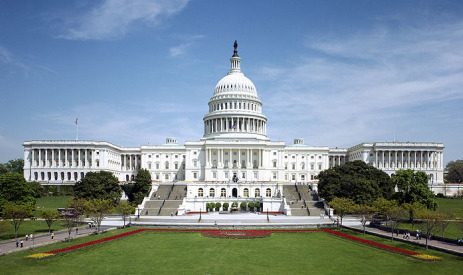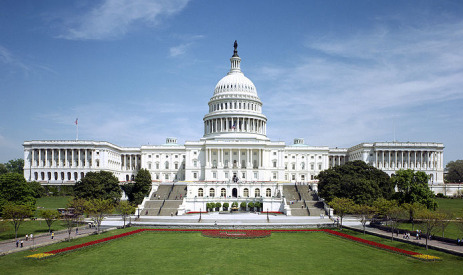 Photo: Wikipedia“One of my top priorities next year is to have an energy policy that begins to address all facets of our over-reliance on fossil fuels,” President Barack Obama told Rolling Stone.
Photo: Wikipedia“One of my top priorities next year is to have an energy policy that begins to address all facets of our over-reliance on fossil fuels,” President Barack Obama told Rolling Stone.
If Republicans regain a majority in the House, the recent health care bill isn’t the only thing they have vowed to roll back: Rep. Jim Sensenbrenner (R-Wis.) “wants to keep the Select Committee on Energy Independence and Global Warming alive so it can investigate climate science and police President Obama’s green policies.”
In the same vein, Rep. Darrell Issa (R-Calif.) has promised to make re-investigating “climategate” a top priority.
In what could be a taste of things to come, Sen. James Inhofe (R-Okla.) issued a report arguing the Environmental Protection Agency’s new rules on industrial boilers could cost 800,000 jobs — a report the EPA immediately dismissed.
19 reasons Congress won’t pass a renewable energy standard, or any other energy bill, this year: Citing the complexity of any such bill, Senate Majority Whip Richard Durbin (D-Ill.) said on Tuesday any energy bill slated for the upcoming lame duck session of Congress is “a long shot.” Senate Energy and Natural Resources Chairman Jeff Bingaman (D-N.M.) agrees.
Perhaps more important for the fate of such a bill are the 19 other bills Senate Democrats have lined up for the six-week legislative session, many of which appear to be a higher priority. If it did happen, a bipartisan renewable energy standard would probably include both nuclear and natural gas, which vexes environmentalists no end.
Will California defeat climate regulation-killing Proposition 23?: As the date for California’s many November statewide ballot initiatives creeps up, the intensity of the battle over Proposition 23, which would effectively repeal California’s impending greenhouse gas reduction initiative, is ramping up.
Gov. Arnold Schwarzenegger used the fourth anniversary of the passage of California’s landmark climate change law to ask “Does anybody really believe they [out-of-state energy companies who are financing Proposition 23] are doing this out of the goodness of their black oil hearts — spending millions and millions of dollars to save jobs?”
Meanwhile, the Los Angeles Times articulated its reasons for citizens to vote no on 23, and Grist infographicized the unexpected bolus of cash donated to the campaign to defeat the measure.
Related: the Center for American Progress would like to remind you last year the oil and gas industry spent about a half a billion dollars lobbying against, among other things, climate legislation.
The Mobius strip of clean energy and economics: A new poll reveals a majority of Americans believe global warming exists and is due to human activity, but economics trumps it as an issue of concern. The reality at the local level is more complicated, however: despite 12 percent unemployment in their area, locals in Bay City, Texas, are now condemning the construction of a coal-fired power plant in their town.
More than 180 U.S. lawmakers argued China is using “predatory trade practices” to fashion an industrial policy that “gives its manufacturers an unfair advantage in the green technology revolution.”
“Tar sands are destroying the planet but at least Canadians are nice”: Canada’s tar sands might be even worse, as a source of automobile fuel, than plain old crude from the Middle East in terms of net greenhouse gas emissions, but at least they’re not located in Iran or Venezuela, says Sen. Lindsey Graham (R-S.C.) and a growing chorus of Canadian conservatives.
The slippery carbon accounting behind biomass: Builders of biomass plants from Maine to Oregon are up in arms about forthcoming EPA rules that wouldn’t automatically treat biomass emissions as carbon neutral.
U.S. energy policy is “just stupid,” says CEO of General Electric: The lack of U.S. legislative action on emissions hasn’t done green technology investors any favors, says the CEO of Spanish wind power utility Iberdrola SA. The company “is investing $10 billion in wind power and energy-related projects across the U.S. over the next few years, but political and regulatory uncertainties could stall future investments.”
Venture Capitalists at the early end of the green tech investment spectrum aren’t doing well, either, apparently because investments in that field require huge amounts of cash and decades to pay off.
The FutureGen clean coal plant has secured $1 billion in financing from the U.S. Department of Energy and could begin construction as early as 2012.
Waiting for the electric car? Don’t hold your breath: One of the co-founders of Tesla motors said in a speech gas would have to be at $10 a gallon before the economics of an electric family car make sense for most Americans, but gas-electric hybrid technology could have a big impact on work vehicles.
Wind on tap: Italian towns whose chief export
had previously been olives are now selling enough electricity produced by wind turbines to completely subsidize local services like trash pickup.
States on the East Coast of the U.S. could get half their power from offshore wind turbines, says advocacy group Oceana.
Some wind technologies may have reached maturity in terms of falling costs, at least for now. A report from the U.K. says the cost of offshore wind is unlikely to fall in the immediate future, which may increase electricity costs there.
Scotland’s first minister has declared the country could get 100 percent of its energy from renewables by 2025.
The greenhouse gas that’s easy to ignore and reduce: Methane is between 27 and 72 times as potent a climate warming agent as CO2, depending on your time horizon, so it’s a good thing the U.S. and Mexico are trying to get other countries to sign on to an initiative to reduce emissions of it.
Green lifestyles of the rich and possibly deluded: Economists at Newcastle University believe the “rebound” effects of policies designed to reduce carbon emissions mean neither shopping online or working at home are the “green” choice.
Architects in the U.S. are no good at green building because they’re educated as designers, not engineers. Case in point: the new Las Vegas hotel whose curved glass exterior cooks its inhabitants with focused sunlight, like a giant magnifying glass.
Google just invested $1 million in the world’s first human monorail.
The Climate Post offers a rundown of the week in climate and energy news. It is produced each Thursday by Duke University’s Nicholas Institute for Environmental Policy Solutions.


